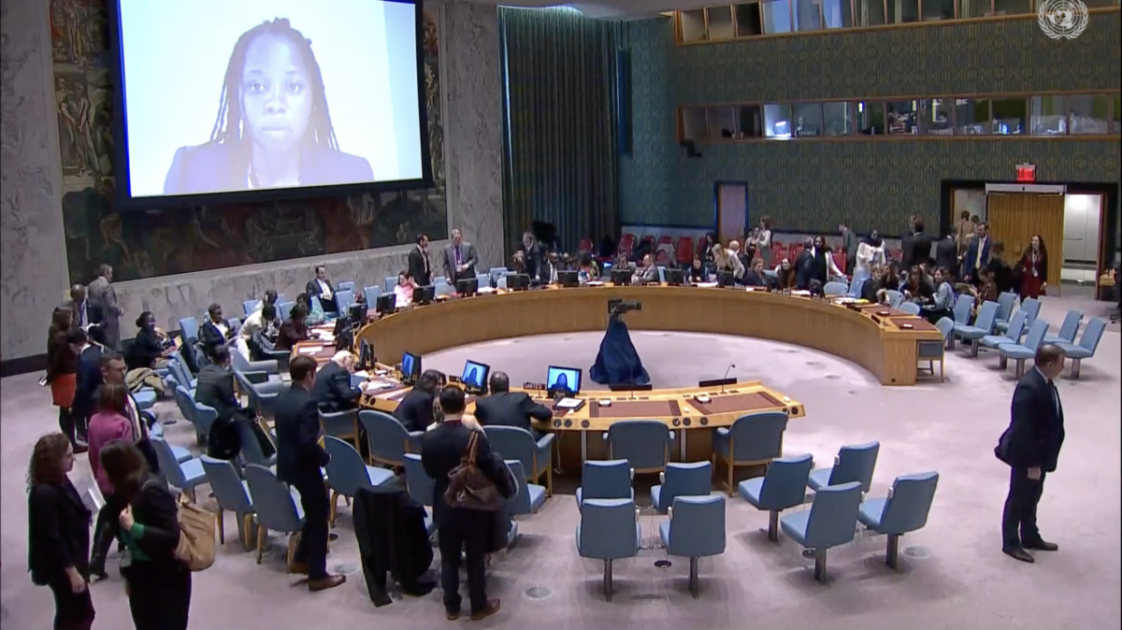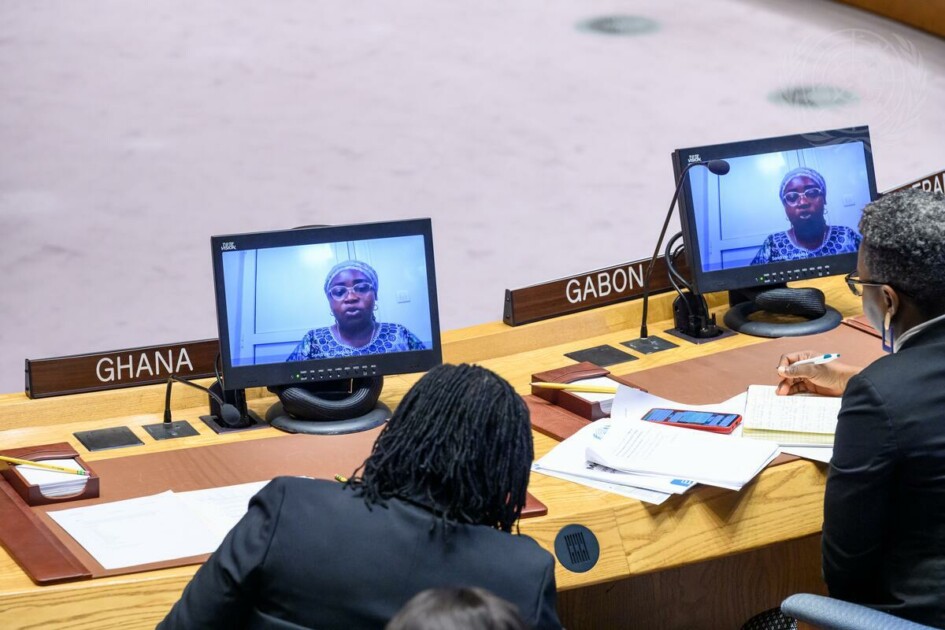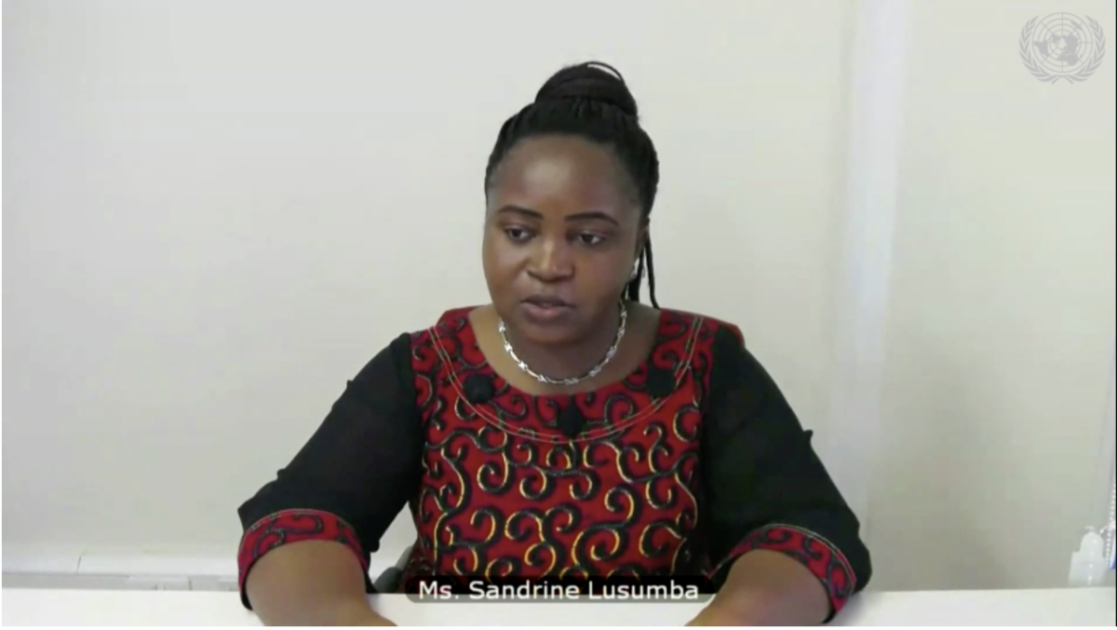Democratic Republic of the Congo
Women in the Democratic Republic of Congo continue to face widespread sexual violence, disease, and displacement in conflict situations arising from clashes between dozens of armed groups. Often, sexual violence and rape are used as terror tactics and weapons of war, and despite the ratification of the Convention on the Elimination of All Forms of Discrimination against Women (CEDAW) and the Women’s Platform for the Peace, Security and Cooperation Framework, women are still largely underrepresented in peacebuilding efforts. Additionally, women activists face rape as a form of torture by government actors who disagree with their political activity. The United Nations Organization Stabilization Mission in the DRC (MONUSCO) aims to provide protection for civilians, including reducing the threat of armed groups perpetrating sexual and gender-based violence, monitoring and reporting on sexual violence and ensuring women’s participation in stabilization and national political dialogue.
Democratic Republic of the Congo
Women in the Democratic Republic of the Congo continue to face widespread sexual violence, disease, and displacement in conflict situations arising from clashes between dozens of armed groups. Often, sexual violence and rape are used as terror tactics and weapons of war, and despite the ratification of the Convention on the Elimination of All Forms of Discrimination against Women (CEDAW), and the Women’s Platform for the Peace, Security and Cooperation Framework, women are still largely underrepresented in peacebuilding efforts.
Additionally, women activists face rape as a form of torture by government actors who disagree with their political activity. The United Nations Organization Stabilization Mission in the DRC (MONUSCO) aims to provide protection for civilians, including reducing the threat of armed groups perpetrating sexual and gender-based violence, monitoring and reporting on sexual violence and ensuring women’s participation in stabilization and national political dialogue.
Current and Past Recommendations to the UN Security Council (Monthly Action Points)
The Security Council is expected to renew the mandate and consider a report of the UN Organization Stabilization Mission in the Democratic Republic of Congo (MONUSCO). The existing references to women and girls in both the preambular and operative paragraphs of the previous resolution MONUSCO’s mandate should be maintained (S/RES/2409 (2018), OPs 36(i)(b), 37(ii)(b), 39, 40, 41). In addition, the Council should:
- Include a provision in MONUSCO’s mandate to monitor threats to CSOs, including women’s groups, and restrictions on democratic space (S/RES/2122 (2013), OP 4) as well as prioritize the protection of women politicians, candidates, activities and human rights defenders (CEDAW/C/COD/CO/6-7). In accordance with Law 15/013, on women’s rights and gender parity, the Government is to establish, and with adequate resources, the Interministerial Committee and the National Council on Gender and Parity.
- Include a provision in MONUSCO’s mandate which requires the mission to support the Government’s implementation of the NAP on Resolution 1325 (2000) (S/RES/2242 (2015), OP 2).
- Include specific language in MONUSCO’s mandate that calls on humanitarian efforts, including the Ebola response, to be gender-sensitive and particularly engage with women and women’s groups.
- Add new language in MONUSCO’s mandate that emphasizes the importance of ensuring any ‘enhanced political and conflict analysis’ is gender-sensitive (S/RES/2409 (2018), OP 33).
- Emphasize that engaging with diverse women’s groups, including those representing marginalized communities, should be central to implementing its protection of civilians mandate (S/RES/2409 (2018), OP 36(i)(c)), as well as its efforts to support implementation of the 31 December 2016 political agreement (S/RES/2409 (2018), OP 36(ii)(a)).
- Call upon the Government to effectively implement Act 08/005 (Article 3(5)) of 10 June 2008 which requests that political parties consider gender parity when establishing electoral lists and ensure that women are significantly represented in high- level decision-making positions.
- Call upon the Government to enact the “Law on the prevention, control and reduction of small arms and light weapons and their ammunition,” which has been pending since 2013, and further engage CSOs, including women’s groups, in the development and implementation of disarmament and arms control programs that are gender-sensitive and tailored to the local context.
The Security Council is expected to renew the mandate and consider a report of the UN Organization Stabilization Mission in the Democratic Republic of Congo (MONUSCO). The existing references to women and girls in both the preambular and operative paragraphs of the previous resolution MONUSCO’s mandate should be maintained (S/RES/2409 (2018), OPs 36(i)(b), 37(ii)(b), 39, 40, 41). In addition, the Council should:
- Include a provision in MONUSCO’s mandate to monitor threats to CSOs, including women’s groups, and restrictions on democratic space (S/RES/2122 (2013), OP 4) as well as prioritize the protection of women politicians, candidates, activities and human rights defenders (CEDAW/C/COD/CO/6-7). In accordance with Law 15/013, on women’s rights and gender parity, the Government is to establish, and with adequate resources, the Interministerial Committee and the National Council on Gender and Parity.
- Include a provision in MONUSCO’s mandate which requires the mission to support the Government’s implementation of the NAP on Resolution 1325 (2000) (S/RES/2242 (2015), OP 2).
- Include specific language in MONUSCO’s mandate that calls on humanitarian efforts, including the Ebola response, to be gender-sensitive and particularly engage with women and women’s groups.
- Add new language in MONUSCO’s mandate that emphasizes the importance of ensuring any ‘enhanced political and conflict analysis’ is gender-sensitive (S/RES/2409 (2018), OP 33).
- Emphasize that engaging with diverse women’s groups, including those representing marginalized communities, should be central to implementing its protection of civilians mandate (S/RES/2409 (2018), OP 36(i)(c)), as well as its efforts to support implementation of the 31 December 2016 political agreement (S/RES/2409 (2018), OP 36(ii)(a)).
- Call upon the Government to effectively implement Act 08/005 (Article 3(5)) of 10 June 2008 which requests that political parties consider gender parity when establishing electoral lists and ensure that women are significantly represented in high- level decision-making positions.
- Call upon the Government to enact the “Law on the prevention, control and reduction of small arms and light weapons and their ammunition,” which has been pending since 2013, and further engage CSOs, including women’s groups, in the development and implementation of disarmament and arms control programs that are gender-sensitive and tailored to the local context.
Relevant Resources









